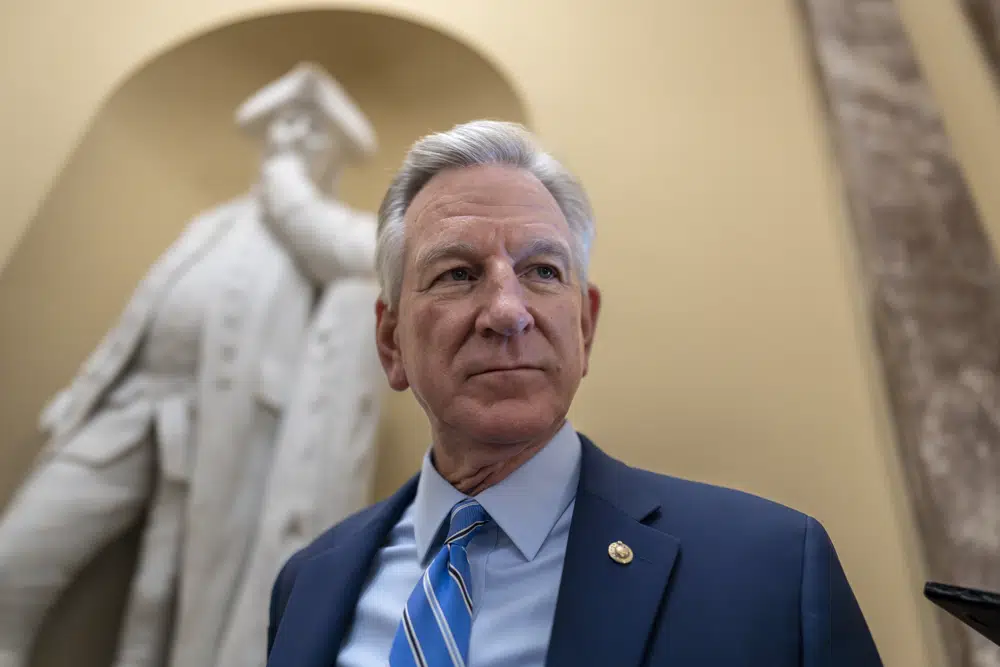Kate Britt, Tommy Tuberville, John Cornyn, and colleagues introduce resolution to strike down Joe Biden’s border policies

U.S. Senators Katie Britt (R-Alabama) and Tommy Tuberville (R-Alabama) recently joined Sen. John Cornyn (R-Texas) and five colleagues in introducing a joint resolution of disapproval under the Congressional Review Act to strike down President Biden’s Circumvention of Lawful Pathways rule. The Biden Administration’s rule purports to take a hard line on illegal migration. However, the senators argue the rule is riddled with exceptions and funnels migrants into unlawful parole programs that the U.S. Department of Homeland Security (DHS) has set up without Congress’ consent to allow more migrants with weak or non-existent asylum claims to enter the United States. “As the border disaster rages on, the Biden Administration continues to unilaterally install irresponsible policies that weaken our national security and disregard the rule of law,” said Sen. Britt. “President [Joe] Biden’s Circumvention of Lawful Pathways rule is a transparent attempt to reclassify illegal migration as legal immigration so that the unprecedented numbers at the border appear better on paper than they are in reality.” “Last month, encounters at the border jumped by 30%,” Britt continued. “The Administration is clearly unserious about ending this crisis, as they are pulling 1,100 active duty personnel from the border while daily encounters continue to rise steadily. This rule is just the latest in a series of dangerous and unserious policies that allow transnational criminal organizations like the cartels to illegally traffic deadly drugs into our communities, schools, and homes. It’s time for the Administration to actually secure the border – not let more people into our country’s interior under different terminology.” “Joe Biden can’t run from his record on the border,” said Sen. Tuberville. “He single-handedly caused the worst border crisis in our history, flooding our country with some 5 million illegal border crossings and unprecedented quantities of deadly drugs. His latest rule might score political points, but it’s riddled with loopholes and won’t actually protect our country. I’m proud to join my colleagues today to stand up and stop it.” “The Biden administration’s rule is an unserious attempt at resolving the border crisis and is full of loopholes that the cartels will easily exploit to continue moving unlawful migrants into the United States and overwhelm our Border Patrol,” Sen. Cornyn said. “Rather than stop unlawful migration, President Biden is using this rule to funnel the migrants into unlawful parole programs, and this resolution would put an end to this shell game to hide an unprecedented level of illegal immigration.” Sens Britt, Tuberville, and Cornyn were joined on the resolution by Sens. Marsha Blackburn (R-Tenn.), Cynthia Lummis (R-Wyoming), Ted Budd (R-North Carolina), Steve Daines (R-Montana), and Cindy Hyde-Smith (R-Mississippi). The Biden Administration’s Circumvention of Lawful Pathways rule went into effect on the same day the Center for Disease Control and Prevention’s (CDC) Title 42 public health order expired on May 11, 2023. This rule funnels migrants into one of three “lawful” pathways, including: The Sens. claim that the first two pathways constitute an abuse of the DHS Secretary’s parole authority, which under our immigration law is only to be used on a true case-by-case basis. The Senators further claim that illegal immigrants and the transnational criminal organizations that take advantage of them will quickly learn to exploit these loopholes and overwhelm our detention facilities as Border Patrol attempts to adjudicate whether migrants fall into one of the numerous exceptions. Katie Britt is the Ranking member of the Homeland Security Subcommittee of the Senate Committee on Appropriations. To connect with the author of this story or to comment, email brandonmreporter@gmail.com.
Katie Britt, Tim Scott, and colleagues lead a bicameral amicus brief challenging the CFPB’s funding structure

U.S. Senator Katie Britt recently joined Ranking Member Tim Scott (R-S.C.) of the Senate Committee on Banking, Housing, and Urban Affairs, Chairman Patrick McHenry (R-North Carolina) of the House Financial Services Committee, Representative Andy Barr (R-Kentucky), the Chairman of the Subcommittee on Financial Institutions and Monetary Policy, Representative Bill Huizenga (R-Michigan), the Chairman of the Subcommittee on Oversight and Investigations, and a bicameral group of 132 members of Congress in filing an amicus curiae brief to the Supreme Court in Consumer Financial Protection Bureau, et al., v. Community Financial Services Association of America, Limited, et al. U.S. Senator Tommy Tuberville (R-Alabama) has also joined the amicus brief. The brief urges the Supreme Court to uphold the Fifth Circuit’s decision that the Consumer Financial Protection Bureau’s (CFPB) funding structure is unconstitutional and to make the Bureau’s funding subject to congressional appropriations like most of the federal government. “The Constitution clearly grants Congress power over the appropriations process. The CFPB should be no exception but has been operating outside of this lawful process with little oversight or taxpayer accountability,” said Senator Britt. “This amicus brief reaffirms the importance of spending public funds as directed by Congress and ‘not according to the individual favor of Government agents.’ The current funding scheme utilized by the CFPB is unsustainable and unconstitutional, and I urge the Court to uphold the Fifth Circuit’s decision.” “Thankfully, our government has a system of checks and balances, one of which includes congressional oversight and the power of the purse—appropriations,” Sen. Scott said. “In these important and trusted roles, we analyze and scrutinize the executive branch’s actions on behalf of the American taxpayer, so that the voices of the country’s citizens are heard and their viewpoints reflected. Unfortunately, the Consumer Financial Protection Bureau—or the CFPB—is a notable exception. It is not accountable to Congress or the American taxpayer through the appropriations process, and it routinely and brazenly acts outside of the scope of its authority.” The brief states, “The Court need not determine which particular aspect of the CFPB’s funding scheme is the most problematic. This is the easy case. The CFPB ‘is in an entirely different league’ from other entities when it comes to its insulation from Congress… to the point that the CFPB currently operates as ‘a sort of junior-varsity Congress’ setting its own funding levels in perpetuity… Such insulation means that Congress itself is not determining the CFPB’s funding. The Court should affirm the judgment below, which will return the matter of the CFPB’s funding to the normal political and legislative channels, as Article I and the Appropriations Clause require.” Questions about the constitutionality of the CPFB have followed the agency since its founding in the early years of the Obama Presidency. Then U.S. Sen. Richard Shelby (R-Alabama) said. “For years, I have argued that supporters of Dodd-Frank sacrificed our Constitution in the name of bureaucratic independence,” Shelby stated. “While the court’s ruling today is a victory for accountability, it is meaningless without a President who is willing to rein in the unmatched authority of the CFPB’s Director.” Conservatives are optimistic that the Court will rule to place the troubled agency under congressional oversight through the budgeting process. Katie Britt was elected to the U.S. Senate in 2022. To connect with the author of this story or to comment, email brandonmreporter@gmail.com.
Katie Britt and colleagues pass legislation preventing adversarial nations from buying American farmland

U.S. Senator Katie Britt (R-Alabama) recently joined her colleagues in passing the bipartisan, bicameral Promoting Agriculture Safeguards and Security (PASS) Act. This legislation aims to prevent China, Russia, Iran, and North Korea from investing in, purchasing, leasing, or otherwise acquiring U.S. farmland. The bill was introduced by Senator Mike Rounds (R-South Dakota) and is cosponsored by Senator Britt and nine of her Senate colleagues. Companion legislation was introduced in the U.S. House of Representatives by U.S. Representative Elise Stefanik (R-New York). The PASS Act would add the Secretary of Agriculture as a standing member of the Committee on Foreign Investment in the United States (CFIUS) to consider agricultural needs when making national security determinations. Additionally, it would require a CFIUS review of agricultural land and business transactions by foreign individuals or entities and would also direct the President to prohibit any agricultural land transaction in the U.S. made by a foreign adversary. “I believe that one acre of American farmland owned by our adversaries is one acre too many,” said Senator Britt. “I’m proud to cosponsor this legislation and grateful for Senator Rounds’ leadership on this critical issue. Food security is national security, and we must prevent threats to the U.S. agricultural community that feeds and clothes our state, nation, and world. I’ll always fight to defend hardworking Americans while protecting our homeland.” “China and Russia are our near-peer adversaries, and North Korea and Iran are no friends of the United States,” said Sen. Rounds. “These four adversaries view America as their top competitor and only wish to gain advantage and opportunities to surveil our nation’s capabilities and resources. This commonsense provision will make our homeland more secure. I am pleased this amendment was included in this year’s NDAA, and I look forward to working with my colleagues to move this legislation across the finish line.” Earlier this year, Senator Britt participated in a Senate Committee on Banking, Housing, and Urban Affairs hearing where she questioned Clay Lowery, the former chairman of CFIUS, who affirmed that the Secretary of Agriculture should likely be involved in CFIUS in “a systematic way.” This legislation is similar to the Foreign Adversary Risk Management (FARM) Act, which was introduced by Sen. Tommy Tuberville (R-Alabama). Britt also cosponsored the FARM Act. “Over the past few years, we’ve seen an alarming increase in foreign purchases of farmland and food companies, particularly by China,” said Sen. Tuberville. “These foreign investments are now reaching every piece of the very large puzzle that makes up our agriculture industry, from farming and processing, to packaging and shipping. That’s why America’s agriculture community needs to have a permanent seat at the table when our government vets foreign investment in our country. Adding all parts of the agricultural supply chain to the list of transactions reviewed by CFIUS is the first step toward ensuring America’s agricultural suppliers can keep food on tables across the country.” Additionally, Britt introduced the Not One More Inch or Acre Act with Sen. Tom Cotton (R-Arkansas). That legislation would prevent any Chinese national or entity from owning American land. The PASS Act was passed as part of the Senate’s Fiscal Year 2024 National Defense Authorization Act (NDAA). Katie Britt is the ranking member of the Homeland Security Subcommittee of the Senate Committee on Appropriations. She was elected to the Senate in 2022. To connect with the author of this story or to comment, email brandonmreporter@gmail.com
Donald Trump to appear in court before his speech in Alabama on Friday

Former President Donald Trump will speak to a packed house of over 2,200 Alabama Republicans in Montgomery on Friday. The former President, however, is scheduled to appear in a Washington, D.C. courtroom on Thursday afternoon to answer charges that he used “unlawful means” in an attempt to challenge the results of the 2020 presidential election and maintain power. Trump will be arraigned on an indictment charging him with conspiracy to defraud the United States; conspiracy to obstruct an official proceeding; obstruction; and conspiracy against the right to vote and to have one’s vote counted. He is scheduled to appear before Magistrate Judge Moxila A. Upadhyaya at the E. Barrett Prettyman Courthouse around 3:00 p.m. CDT. The reaction by Alabama leaders to the news was mixed. Congressman Gary Palmer (R-AL06) released a statement slamming the latest indictments. “The latest indictment appears to be an even greater stretch of the law in an effort to destroy Donald Trump,” said Rep. Palmer. “Much of this indictment centers on statements made by President Trump on January 6th that create legal problems for the prosecution in regard to free speech. Regardless of any opinions about President Trump or his statements about the outcome of the 2020 election, President Trump’s statements are protected by the First Amendment right to free speech, especially political speech.” “As some legal experts have already pointed out, this is criminalization of disinformation and misinformation which raises serious concerns about the public’s right to speak openly in opposition to policies they oppose,” Palmer continued. “This is especially troublesome in view of the Biden Administration’s aborted attempt to establish a bureau of disinformation that many believe would have been weaponized against the political opponents of President Biden and the Democratic Party. Consequently, this indictment falls short of the criminal legal standard for charging anyone and has the appearance of indicting political speech.” Congresswoman Terri Sewell (D-AL07) said that on social media that the indictment shows that no one is above the law. “Today’s indictment shows that no one is above the law,” said Rep. Sewell. “We are seeing the political process play out, and though we do not know the outcome, all parties who are involved in one of the darkest days in our nation’s history must be held accountable.” Former Congressman Mo Brooks (R-AL05), who led the floor fight in the House of Representatives to overturn the electoral college results, is more critical of the former President. Brooks said on Twitter, “In early 2022, #DonaldTrump demanded I publicly support: 1. Rescinding 2020 election. 2. Physically removing Biden from White House. 3. Putting Trump back into White House. 4. America conducting a special presidential election. ALL violate Constitution &/or federal statutes.” Brooks said, “@Mike_Pence is right. A candidate who puts self above US Constitution should NEVER be GOP nominee. When #DonaldTrump told me to support violating Constitution & federal statutes, I refused. So Trump “unendorsed” me & endorsed #KatieBritt. So be it.” Brooks lost the 2022 Republican primary runoff for U.S. Senate to first-time candidate Katie Britt – who is now Alabama’s junior Senator. Brooks shared a link to a story about former Vice President Mike Pence criticizing Trump and his legal team. This is the third round of indictments against Trump, but likely not the last. The legal woes that have already cost his campaign over $40 million have not hurt him with Republican primary voters. He is dominating Pence and his other GOP rivals in early polling. To connect with the author of this story or to comment, email brandonmreporter@gmail.com.
Katie Britt votes for legislation to fight fentanyl epidemic

U.S. Senator Katie Britt (R-Ala.) recently joined her Senate colleagues in passing the bipartisan Fentanyl Eradication and Narcotics Deterrence (FEND) Off Fentanyl Act. This legislation seeks to stop the flow of deadly fentanyl into our country by choking off the income source of those who traffic synthetic opioids. Drug overdoses killed 107,000 Americans in 2021, and 65% of those deaths were attributed to fentanyl. “The devastation that this deadly poison has brought to our communities, schools, and families must end now,” said Sen. Britt. “Truly stopping this nationwide crisis means that we have to go after the well-financed, well-organized, and well-connected individuals profiting from fentanyl trafficking. This bipartisan legislation would ensure that the Treasury Department has the tools they need to protect Americans and hold bad actors accountable. I’m proud to have cosponsored this legislation and grateful to my colleagues for supporting it.” This legislation was introduced by Ranking Member Senator Tim Scott (R-South Carolina) and cosponsored by Senator Britt, Senate Banking Committee Chairman Sherrod Brown (D-Ohio), Senate Committee on Armed Services Chairman Jack Reed (D-Rhode Island), Ranking Member Roger Wicker (R-Mississippi), and 59 other senators. “Mexican traffickers and Chinese drug suppliers are fueling America’s fentanyl crisis. My FEND Off Fentanyl Act targets the financial assets of these criminal groups, cutting off their income right at the source,” said Sen. Scott. “By including this bill in the NDAA, we’re one step closer to ensuring our country can defend our communities from this deadly drug and protecting our national security.” The FEND Off Fentanyl Act is a bill designed to target the flow of the deadly narcotic into the United States by empowering the U.S. Department of the Treasury to target, sanction, and block the financial assets of transnational criminal organizations trafficking fentanyl. In addition, the proceeds from any seized assets would be used to further law enforcement efforts. “Truly stopping the influx of this deadly poison into our communities, schools, and families means that we have to go after the well-financed, well-organized, and well-connected individuals profiting from fentanyl trafficking,” said Senator Britt. “The fact that this legislation passed the committee unanimously shows that the Senate is working on a bipartisan basis to ensure that we empower the Treasury Department with the tools they need to protect Americans and hold bad actors accountable. I urge Senator Schumer to bring this legislation to the Senate floor with the urgency this crisis demands.” The FEND Off Fentanyl Act was passed as part of the Fiscal Year 2024 National Defense Authorization Act (NDAA). Fentanyl is now the leading cause of death for Americans under 45, and more than 150 people die each day from overdoses related to fentanyl. Multiple national organizations have supported the bill, including Mothers Against Prescription Drug Abuse (MAPDA), the American Association for the Treatment of Opioid Dependence, the Fraternal Order of Police, the National Sheriffs’ Association, and FDD Action. Last year, the Drug Enforcement Administration (DEA) seized over 379 million deadly doses of fentanyl. That is enough to supply a lethal dose to every American. Given the sharp increase in fentanyl-caused deaths, Scott claims that it is clear that a staggering amount of fentanyl is making its way into our country from the chemical suppliers in the People’s Republic of China (PRC) and drug cartels in Mexico. Katie Britt is the Ranking Member of the Homeland Security Subcommittee for the Senate Committee on Appropriations. Sen. Britt has led hearings on fentanyl and spoken out against the Biden Administration’s proposed budget cuts to the U.S. Department of Homeland Security. Britt was elected to the Senate in 2022. To connect with the author of this story or to comment, email brandonmreporter@gmail.com.
Tommy Tuberville urges Senate investigation into human trafficking

U.S. Senator Tommy Tuberville (R-Alabama) joined Sen. Ron Johnson (R-Wisconsin), Sen. Katie Britt (R-Alabama), and the entire Senate Republican conference in sending a letter to Sens. Richard Blumenthal (D-Connecticut), who chairs the Permanent Subcommittee on Investigations; Richard Durbin (D-Illinois), who chairs the Committee on the Judiciary; Gary Peters (D-Michigan), who chairs the Committee on Homeland Security and Governmental Affairs; and Robert Menendez (D-New Jersey), who chairs the Committee on Foreign Relations, calling for increased oversight and investigations into human trafficking. The letter highlighted recent Department of Homeland Security (DHS) data underscoring the humanitarian crisis at the border. It also included a graph illustrating the rise in encounters at the southwest border. The senators wrote to the Democrat chairmen, “[g]iven your committees’ roles in overseeing DHS, we urge you to investigate and hold hearings into DHS’s efforts to combat human trafficking. Without our attention and leadership, human trafficking will continue to plague this country.” The senators noted that the recent movie Sound of Freedom (which is based on the true story of former Homeland Security Investigations agent Tim Ballard’s efforts to rescue victims from a Colombian sex-trafficking ring) “has played an important role in creating public awareness of this modern-day form of slavery.” “The United States Senate must continue to conduct much-needed oversight of this administration’s border policies to find immediate solutions to combat one of the most disturbing consequences of inadequate border security: the proliferation of human trafficking,” the Senators added. Tuberville was elected to the U.S. Senate in 2020 after a forty-year career as an educator, coach, and sports broadcaster. He is best known for his tenure as a college football head coach at Ole Miss, Auburn, Texas Tech, and Cincinnati. He represents Alabama in the United States Senate, where he is a member of the Senate Armed Services, Agriculture, Veterans Affairs, and HELP Committees. To connect with the author of this story or to comment, email brandonmreporter@gmail.com
Alabama Legislators react to Space Command decision, denouncing it as a ‘political move’

On Monday, President Joe Biden formalized what most political observers already knew when he announced that he was going to block Space Command from coming to Alabama. To Alabama legislators, the decision seems to have been made for political reasons, as the President needs Colorado’s electoral college votes to have any realistic chance of surviving next year’s presidential election. No Democrat has carried the state of Alabama in a presidential race since 1976, and Biden has no chance of being competitive in conservative Alabama. Biden said that U.S. officials believe that keeping the command in Colorado Springs will avoid a disruption in readiness that moving would cause. U.S. officials told The Associated Press that Biden was convinced by the head of Space Command, Gen. James Dickinson, who argued that moving his headquarters now would jeopardize military readiness. A number of Alabama leaders noted their displeasure at Biden’s decision to keep Space Command in Colorado Springs. Colorado Springs was fourth behind Redstone Arsenal in Huntsville, Nebraska, and San Antonio, Texas. Space Command was formed in 2019. The command was temporarily based in Colorado, and Air Force and Space Force leaders initially recommended it stay there. In the final days of his presidency, Donald Trump decided it should be based in Huntsville. Congressman Robert Aderholt (R-AL04) said, “Not only is it outrageous, but also unfortunate for the American people to hear that the Secretary of the Air Force allowed politics to circumvent his, and the Department of Defense’s, own basing selection process that determined Huntsville, Alabama as the preferred location of SPACECOM.” “Over and over again, the legitimate process proved that Alabama was the right choice for SPACECOM HQ,” said Rep. Aderholt. “Unfortunately for this nation this decision is the latest chapter in the long saga of the Biden Administration’s failing national security record, and I know the majority of the American people feel the same way. As a nation, we must do better.” Congresswoman Terri Sewell (D-AL07) said, “The Administration’s decision to keep Space Command in Colorado bows to the whims of politics over merit. Huntsville won this selection process fair and square based on the merits. In three separate reports, Huntsville reigned victorious, whereas Colorado did not come in second or even third. This reversal is as shameful as it is disappointing.” “I expected more from the Biden Administration,” said Sewell. “A decision of this magnitude should not be about red states versus blue states, but rather what is in the best interest of our national security. To be clear, the Alabama Congressional Delegation stands united in opposition to this decision.” Congressman Gary Palmer (R-AL06) said, “This decision made by the Biden Administration is unacceptable,” said Rep. Palmer. “When making decisions, the administration has continuously put politics over what is best for the nation. The Department of Defense determined that Huntsville, Alabama, was the best location for Space Command long ago. Instead, they are picking Colorado, the fifth best option by their very own report. Not only is this decision another broken promise and the result of political gamesmanship, but it jeopardizes our nation’s national security and sets a dangerous precedent for future decisions made solely based on political preference.” “Over two and a half years ago, the Air Force chose Redstone Arsenal in Huntsville for the headquarters of Space Command over 59 other cities on the basis of 21 different criteria,” explained U.S. Senator Tommy Tuberville (R-Alabama). “As soon as Joe Biden took office, he paused movement on that decision and inserted politics into what had been a fair and objective competition—not because the facts had changed, but because the political party of the sitting President had changed.” “The Biden Administration has been talking a lot about readiness over the past few months, but no Administration has done more to damage our military readiness in my lifetime,” Sen. Tuberville said. “They’ve politicized our military, destroyed our recruiting, misused our tax dollars for their extremist social agenda, and now they are putting Space Command headquarters in a location that didn’t even make the top three. They are doing this at a time when space is only becoming more important for national security.” Congressman Mike Rogers (R-AL03) said, “Huntsville, Alabama was chosen to be the headquarters of U.S. Space Command because it was the strongest location and investigations by the DoD IG and GAO have upheld this decision. Yet, the Biden administration decided to make Colorado Springs, Colorado, which came in fifth in the Selection Phase, the location of the headquarters for U.S. Space Command. It’s clear that far-left politics, not national security, was the driving force behind this decision.” Both Houses of Congress had just passed their versions of the National Defense Authorization Act (NDAA), with the Senate only finishing their version late on Thursday. Congress then left for its August recess. “It is also shameful that the Administration waited until Congress had gone into recess and already passed next year’s defense budget before announcing this decision,” Tuberville said. “The top three choices for Space Command headquarters were all in red states—Alabama, Nebraska, and Texas. Colorado didn’t even come close. This decision to bypass the three most qualified sites looks like blatant patronage politics, and it sets a dangerous precedent that military bases are now to be used as rewards for political supporters rather than for our security.” U.S. Senator Katie Britt (R-Alabama) said, “President Biden has irresponsibly decided to yank a military decision out of the Air Force’s hands in the name of partisan politics. Huntsville finished first in both the Air Force’s Evaluation Phase and Selection Phase, leaving no doubt that the Air Force’s decision to choose Redstone as the preferred basing location was correct purely on the merits. That decision should have remained in the Air Force’s purview. Instead, President Biden is now trying to hand the Gold Medal to the fifth-place finisher. The President’s blatant prioritization of partisan political considerations at the expense of our national security, military modernization, and force readiness is a disservice and a dishonor to his oath of office as our nation’s Commander-in-Chief. Locating the permanent Space Command Headquarters on Redstone Arsenal
Tommy Tuberville announces service academy information sessions with Alabama Delegation

On Monday, U.S. Senator Tommy Tuberville announced that his office will be leading informational sessions about the application process for U.S. Service Academies throughout August in conjunction with U.S. Senator Katie Britt and other members of the House delegation. At these sessions, students will be able to learn about each office’s application process from congressional staff and speak with service academy representatives. A complete list of times, dates, and locations for each information session can be found below: Monday, August 7, at 6 pm Northport City Hall Auditorium 3500 McFarland Blvd Northport, AL 35476 Tuesday, August 15, at 6 pm North Huntsville Public Library 3011 Sparkman Drive Huntsville, AL 35810 Thursday, August 17, at 6 pm USS Alabama Battleship Memorial Park The Ward Room on the USS Alabama 2703 Battleship Parkway Memorial Parkway Mobile, AL 36602 Tuesday, August 22, at 6 pm Homewood Public Library—Round Auditorium 1721 Oxmoor Road Homewood, AL 35209 Thursday, August 24, at 6 pm Troy University—Hawkins-Adams Hall 417 University Avenue Troy, AL 36082 Sunday, August 27, at 3 pm Montgomery Academy— Jim Wilson, Jr. Theater 3240 Vaughn Road Montgomery, AL 36106 Tuesday, August 29, at 6 pm Southern Union Community College—The Southern Room 301 Lake Condy Road Opelika, AL 36801 Both U.S. Senators and all seven Alabama Congress members can make appointments to the nation’s service academies: Army (Westpoint), Navy (Annapolis), Air Force (Colorado Springs), and Merchant Marine. Acceptance to a service academy means four years of the highest quality college instruction without debts and a career serving the nation in the armed forces. With increasing threats from Russia, China, Iran, and North Korea, recruiting the best and the brightest to serve as officers in America’s armed forces. To be eligible to receive a service academy appointment, applicants must: · Be a United States Citizen at the time they enter the Service Academy and a legal resident of Alabama; · Be at least 17 years of age but not yet 23 by July 1 of the year they are admitted to the Service Academy (the upper age limit is 25 for Merchant Marine Academy); · Meet the minimum requirements of the Academy to which they are applying. Applying for a Nomination The last date to submit the application is Monday, October 16, 2023. Senator Tuberville represents Alabama in the United States Senate and is a member of the Senate Armed Services, Agriculture, Veterans Affairs, and HELP Committees. To connect with the author of this story or to comment, email brandonmreporter@gmail.com.
Katie Britt recovers at home after brief hospitalization

Senator Katie Britt is home resting after having symptoms that prompted a hospital visit over the weekend. Britt experienced numbness in her face, and it was determined it was caused by a post-viral infection. “While with my family in Montgomery this past weekend, I experienced a sudden onset of numbness in my face. I was admitted to Baptist Medical Center South for evaluation,” Britt said in a statement. “Doctors determined that my symptoms were a result of swelling of a facial nerve, most likely caused by a post-viral infection. A specialist from UAB has subsequently evaluated me on an outpatient basis and concurred with the prognosis and course of treatment,” Britt continued. The Senate is currently on recess. Britt and her colleagues are not due back to D.C. until after Labor Day. “My condition is not life-threatening, and recovery could take several weeks. I am grateful for the medical professionals providing excellent care, and my family and I are deeply grateful for your prayers,” Britt concluded. Katie Britt was elected to the U.S. Senate in 2022 and is on the Senate Appropriations Committee.
Joe Biden decides to keep Space Command in Colorado, rejecting move to Alabama

President Joe Biden has decided to keep U.S. Space Command headquarters in Colorado, overturning a last-ditch decision by the Trump administration to move it to Alabama. The choice ended months of thorny deliberations, but an Alabama lawmaker vowed to fight on. U.S. officials told The Associated Press on Monday that Biden was convinced by the head of Space Command, Gen. James Dickinson, who argued that moving his headquarters now would jeopardize military readiness. Dickinson’s view, however, was in contrast to Air Force leadership, who studied the issue at length and determined that relocating to Huntsville, Alabama, was the right move. The officials spoke on condition of anonymity to provide details of Biden’s rationale for the decision. In announcing the plans, Brig. Gen. Pat Ryder, Pentagon press secretary, said the decision was based on an “objective and deliberate process informed by data and analysis.” He said Defense Secretary Lloyd Austin supported the president’s decision. Reaction to the decision came fast and was sharply divided, as Colorado lawmakers praised it and Alabama officials slammed it as a political maneuver. “This fight is far from over,” warned Rep. Mike Rogers, R-Ala., chairman of the House Armed Services Committee. Biden, said the U.S. officials, believes that keeping the command in Colorado Springs would avoid a disruption in readiness that the move would cause, particularly as the U.S. races to compete with China in space. And they said Biden firmly believes that maintaining stability will help the military be better able to respond in space over the next decade. Those factors, they said, outweighed what the president believed would be any minor benefits of moving to Alabama. Biden’s decision enraged Alabama lawmakers and is sure to fuel accusations that abortion politics played a role in the choice. The location debate has become entangled in the ongoing battle between Alabama Republican Sen. Tommy Tuberville and the Defense Department over the move to provide travel for troops seeking reproductive health care. Tuberville opposed the policy is blocking hundreds of military promotions in protest. The U.S. officials said the abortion issue had no effect at all on Biden’s decision. And they said the president fully expected there would be different views on the matter within the Defense Department. Tuberville, in a statement, said the top three choices for Space Command headquarters were all in Republican-leaning states — Alabama, Nebraska, and Texas — and bypassing them “looks like blatant patronage politics.” Formally created in August 2019, the command was temporarily based in Colorado, and Air Force and Space Force leaders initially recommended it stay there. In the final days of his presidency, Donald Trump decided it should be based in Huntsville. The change triggered a number of reviews. Proponents of keeping the command in Colorado have argued that moving it to Huntsville and creating a new headquarters would set back its progress at a time it needs to move quickly to be positioned to match China’s military space rise. And Colorado Springs is also home to the Air Force Academy, which now graduates Space Force guardians, and more than 24 military space missions, including three Space Force bases. Officials also argued that any new headquarters in Alabama would not be completed until sometime after 2030, forcing a lengthy transition. Huntsville, however, scored higher than Colorado Springs in a Government Accountability Office assessment of potential locations and has long been a home to some of the earliest missiles used in the nation’s space programs, including the Saturn V rocket. It is home to the Army’s Space and Missile Defense Command. According to officials, Air Force Secretary Frank Kendall, who ordered his own review of the matter, leaned toward Huntsville, while Dickinson was staunchly in favor of staying put. The officials said Austin presented both options to Biden. In a statement Monday, Kendall said the service will work to quickly implement Biden’s decision, adding that keeping the command in Colorado will “avoid any disruption to its operational capability.” The decision was hailed as a victory in Colorado lawmakers and condemned in Alabama. “For two and a half years, we’ve known any objective analysis of this basing decision would reach the same conclusion we did, that Peterson Space Force Base is the best home for Space Command,” Sen. John Hickenlooper, D-Colo., said in a statement. “Most importantly, this decision firmly rejects the idea that politics — instead of national security — should determine basing decisions central to our national security.” Sen. Michael Bennet, D-Colo., said the decision “restores integrity to the Pentagon’s basing process and sends a strong message that national security and the readiness of our Armed Forces drive our military decisions.” Rogers, meanwhile, vowed that his committee will continue an investigation into the matter, calling it a “deliberate taxpayer-funded manipulation of the selection process.” He added, “It’s clear that far-left politics, not national security, was the driving force behind this decision.” Republican Alabama Sen. Katie Britt echoed his sentiment, saying it was irresponsible for Biden to “yank a military decision out of the Air Force’s hands in the name of partisan politics.” She said an Air Force evaluation of the potential locations ranked Huntsville first, adding that the decision ”should have remained in the Air Force’s purview.” Republished with the permission of The Associated Press.
Tommy Tuberville and Katie Britt join colleagues in introducing resolution to strike down border policy

On Thursday, U.S. Senators Tommy Tuberville and Katie Britt joined Senators John Cornyn (R-Texas), Marsha Blackburn (R-Tennessee), Cynthia Lummis (R-Wyoming), Ted Budd (R-North Carolina), Steve Daines (R-Montana), and Cindy Hyde-Smith (R-Mississippi) in introducing a joint resolution of disapproval under the Congressional Review Act to strike down President Joe Biden’s circumvention of the Lawful Pathways rule. The Sens. Claim that the Biden policy funnels illegal immigrants into unlawful parole programs that the U.S. Department of Homeland Security (DHS) has established without Congress’ consent. This funneling effect has allowed and encouraged more people with weak or non-existent asylum claims to enter the U.S. “Joe Biden can’t run from his record on the border,” said Sen. Tuberville. “He single-handedly caused the worst border crisis in our history, flooding our country with some 5 million illegal border crossings and unprecedented quantities of deadly drugs. His latest rule might score political points, but it’s riddled with loopholes and won’t actually protect our country. I’m proud to join my colleagues today to stand up and stop it.” “Folks, this is having real implications on real people, and the only people that are benefiting from Joe Biden’s failed policies are not Americans, not these migrants,” Sen. Britt said recently. “We need the American people to stand up and stand with us and say ‘enough is enough.’ When you think about these 300,000 unaccompanied children that have come across — let me tell you something. I’m a Momma. Do you think I’m going to let my child wander in hopes that someone finds them on the other side of the border? Absolutely not.” “I have talked to these young women, and it wasn’t that they were raped every day,” said Britt. “It was how many times a day they were raped. Folks, this has real implications. You look at the real stories of a 13-year-old boy who is being sent to be a day laborer all day long. He’s not living the American Dream. He’s paying back what his parents owe, or he promised to a drug cartel.” “The Biden administration’s rule is an unserious attempt at resolving the border crisis and is full of loopholes that the cartels will easily exploit to continue moving unlawful migrants into the United States and overwhelm our Border Patrol,” said Sen. Cornyn.“Rather than stop unlawful migration, President Biden is using this rule to funnel the migrants into unlawful parole programs, and this resolution would put an end to this shell game to hide an unprecedented level of illegal immigration.” The Biden administration’s Circumvention of Lawful Pathways rule went into effect on the same day the Center for Disease Control and Prevention’s Title 42 public health order expired, on May 11, 2023. This rule funnels illegal immigrants into one of three “lawful” pathways: 1. The administration’s program to grant parole to up to 30,000 Venezuelans, Haitians, Nicaraguans, and Cubans per month, as well as other parole programs the administration has recently set up or expanded. 2. The administration’s “CBP One” mobile app, through which people can make appointments to enter at land ports of entry, where they may be paroled into the interior and given work permits; 3. Seeking asylum at any place or time after having applied for and denied asylum in a third country. The GOP Senators claim that the first two of these three pathways constitute an unlawful abuse of the DHS Secretary’s parole authority, which, under our immigration law, is only to be used on a true case-by-case basis. To connect with the author of this story or to comment, email brandonmreporter@gmail.com.
Katie Britt votes for National Defense Authorization Act

On Thursday, U.S. Senator Katie Britt (R-Alabama) voted to pass the National Defense Authorization Act for Fiscal Year 2024 (NDAA) on a bipartisan basis. The NDAA has been approved annually by Congress for the last 63 years. The NDAA authorizes funding for the U.S. military for the next year, outlines national security priorities, and sets targets for modernizing defense technologies and munitions. “With adversaries such as China, Russia, and Iran becoming increasingly more aggressive, there is no more important priority than our national defense,” said Sen. Britt. “To achieve peace through strength, our warfighters must remain the best trained, best equipped, and best resourced in the world. This legislation makes great strides to ensure that we maintain a robust military through strategic investments and modernization efforts. I will always make the security of our country and the wellbeing of our servicemembers a top priority.” Senator Britt secured passage of a key amendment in the legislation requiring the U.S. Department of Defense (DOD) to submit a report to Congress on the feasibility of allowing American servicemembers and their dependents to keep previously retained mental healthcare via telehealth services while transferring between postings. Sen. Jack Reed (R-Rhode Island) chairs the Senate Armed Services Committee. “This forward-looking defense bill will go a long way toward keeping the American people safe, deterring conflict, and confronting the national security threats we face,” Sen. Reed said. “This bipartisan NDAA provides a historic level of support for our troops and their families, including the largest military pay raise in decades. It authorizes record-level investments in the people, platforms, and programs that our forces need to safeguard the nation and advance U.S. interests worldwide. The bill also accelerates the development of cutting-edge technologies like hypersonics and artificial intelligence to provide our forces with key advantages on the battlefield.” “Our bipartisan approach netted a major win for America’s military men and women and their families,” Reed added. “I appreciate Majority Leader Schumer and Minority Leader McConnell for working to facilitate a thorough debate that allowed all senators to engage and contribute to this bill. I salute Senator Wicker for his continued leadership and partnership. I look forward to working together in conference to produce a strong NDAA that takes on the real threats facing our military.” Sen. Roger Wicker (R-Mississippi) is the Ranking Member of the Committee. “Although I would have preferred a topline defense spending number that better reflects the most dangerous threat environment that the United States has faced since World War II, I appreciate the hard work that the Senate has put into this year’s NDAA,” Sen. Wicker said. “The bill we have delivered takes care of our troops with a substantial pay raise and reforms that will improve quality of life for our servicemen and women. We are also taking pivotal steps toward the monumental investments in our naval power, munitions capacity, and defense industrial base that the moment demands. The bill also harnesses defense innovation through procurement reform and investments in high-tech research.” The Fiscal Year 2024 NDAA authorizes a 5.2% military pay raise, invests in the U.S. Navy, rebuilds our nation’s arsenal by adding critical munitions to the Pentagon’s multi-year procurement (MYP) program, prioritizes individual merit in our military, helps secure the southern border by using previously procured materials to continue building the border wall, and prevents foreign adversaries from investing in, purchasing, leasing, or acquiring American farmland. The 63rd annual NDAA authorizes a total budget of $886 billion in fiscal year 2024 funding for national defense. Within this topline, the legislation authorizes $845 billion for the Department of Defense (DOD) and $32 billion for national security programs within the Department of Energy (DOE). The U.S. House of Representatives passed a separate version of the NDAA earlier this month along partisan lines, with Republicans adding amendments on the House floor that Democrats would not support. The two chambers are expected to take the bill to a Conference Committee to work out differences and agree on a final version before the end of the year. “The Congress once again has an opportunity to send an unmistakable message to China and Russia that we are stalwart in our commitment to a ‘peace through strength’ agenda,” Wicker said. “I am hopeful that working alongside the House, we will send a bill to the president’s desk that puts our national defense on a path toward improving our deterrent capabilities. I am especially grateful for the partnership of Chairman Reed on my first NDAA as ranking member.” To connect with the author of this story or to comment, email brandonmreporter@gmail.com.


